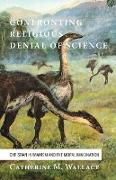- Start
- Confronting Religious Denial of Science
Confronting Religious Denial of Science
Angebote / Angebote:
Confronting Religious Denial of Science: Christian Humanism and the Moral Imagination traces the cultural backstory of contemporary conflicts between biblical literalists who oppose evolution and "New Atheists" who insist that religion is so pernicious it should be outlawed, if not exterminated. That's a clash of fundamentalisms. It's a zero-sum game derived from high Victorian misunderstanding of both religion and science. The God whom science supposedly replaces is the Engineer Almighty sitting at his keyboard, controlling every event on earth. But that's not a viable concept of God. Far better, Wallace argues, to understand Christianity in Clifford Geertz's terms as a system of symbols that both constitutes a worldview and, according to David Sloan Wilson, encourages prosocial behavior. That reframing makes it possible to reclaim what biblical scholars have said for decades: the miracles of Jesus were confrontational symbolic actions. They contradicted the political status quo in colonial Palestine, not the laws of biology. Prayer, she explains, is not magical thinking. It's a creative, highly disciplined introspective process, most familiar to many people in forms like mindfulness meditation. Wallace offers an intriguing exploration of issues that believers seldom discuss in ways that make sense to the religiously unaffiliated.
"Grab a cup of tea and sit down with a provocative new friend. Wallace asks, are there proper places in the heart for both science and religion? She writes of her personal quest to appreciate how discovery and prayer must necessarily complement each other. With insight and warmth she traces the boundaries and the intersections of technology and belief. Like that student in class who asked the questions you wish you could have articulated so well, she bravely puts the challenge: How can human lives best make both logical and spiritual sense?"
--John Kender, Professor of Computer Science, Columbia University
"This is a sensitive and well-thought-out book that explores the relationships between literature, religion, physiology, morality, prayer, science, metaphor, truth and art. If that sounds like a handful, it is. But Catherine M. Wallace handles these subjects with grace and clarity in this excellent book."
--Abby Hafer, author of The Not-So-Intelligent Designer: Why Evolution Explains the Human Body and Intelligent Design Does Not
"Catherine Wallace is right: fundamentalism is problematic on many levels. It is not leading us to the common good. But Wallace is also right that simply decrying fundamentalism is not enough. A winsome replacement must be offered. This book sparks the imagination of an alternative that affirms science and the humanities, including religion. Even those who cannot accept all of the alternative ideas proposed in this book will be better off for having pondered them!"
--Thomas Jay Oord, author of The Uncontrolling Love of God and The Nature of Love
"Wallace skillfully demonstrates that the conflict between science and religion is rooted in distortions of both: a religion that has forgotten its mythic heart and hardened into fundamentalism, and a science that has been mutated by rationalist dreams into dogmatic scientism. Using conversational language and personal anecdotes, Wallace sketches out an alternative: a science shorn of dogmatic pretensions and a religion centered on story and practice, committed to shaping lives of deep compassion. The particular way Wallace puts the pieces together in this accessible book may not be persuasive for everyone (whether the secular humanist trying to make sense of religion or the religious believer trying to join faith with science), but observing how she does it can only inspire and illuminate their own efforts."
--Richard Floyd, author of Down to Earth: Christian Hope and Climat
Folgt in ca. 10 Arbeitstagen
